How the Brexit Will Impact or Has Already Impacted International Joint Ventures?
VerifiedAdded on 2022/08/29
|14
|3493
|22
AI Summary
Contribute Materials
Your contribution can guide someone’s learning journey. Share your
documents today.

R
Secure Best Marks with AI Grader
Need help grading? Try our AI Grader for instant feedback on your assignments.

Executive Summary:
Joint Ventures have always been identified as a key entry mode for many business firms to
gain exposure in the international markets. International joint venture which can also be
referred as cross-border business transactions has been a growing popularity to sustain in the
global economic condition. However this report is exclusively meant to analyze how UK's
exit from the European Union which is commonly known as Brexit , will impact these cross-
border trade transactions, restriction on labor mobility, tax regulations and licensing. The
impact would be finally analyzed with the help of a particular industry sector (automobile
industry) which has been most affected and how multinational firms are surviving the crisis.
Joint Ventures have always been identified as a key entry mode for many business firms to
gain exposure in the international markets. International joint venture which can also be
referred as cross-border business transactions has been a growing popularity to sustain in the
global economic condition. However this report is exclusively meant to analyze how UK's
exit from the European Union which is commonly known as Brexit , will impact these cross-
border trade transactions, restriction on labor mobility, tax regulations and licensing. The
impact would be finally analyzed with the help of a particular industry sector (automobile
industry) which has been most affected and how multinational firms are surviving the crisis.
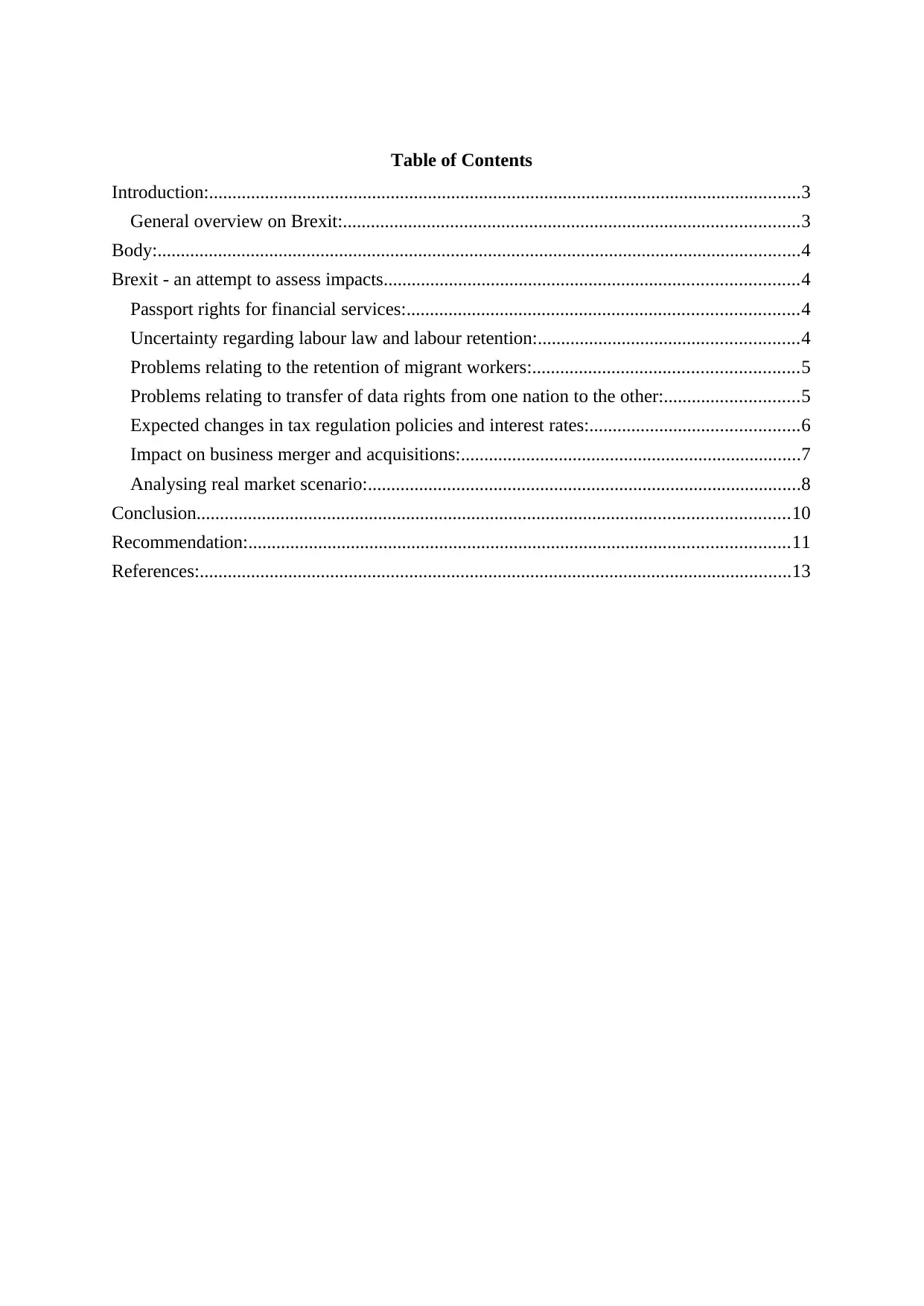
Table of Contents
Introduction:...............................................................................................................................3
General overview on Brexit:..................................................................................................3
Body:..........................................................................................................................................4
Brexit - an attempt to assess impacts.........................................................................................4
Passport rights for financial services:....................................................................................4
Uncertainty regarding labour law and labour retention:........................................................4
Problems relating to the retention of migrant workers:.........................................................5
Problems relating to transfer of data rights from one nation to the other:.............................5
Expected changes in tax regulation policies and interest rates:.............................................6
Impact on business merger and acquisitions:.........................................................................7
Analysing real market scenario:.............................................................................................8
Conclusion...............................................................................................................................10
Recommendation:....................................................................................................................11
References:...............................................................................................................................13
Introduction:...............................................................................................................................3
General overview on Brexit:..................................................................................................3
Body:..........................................................................................................................................4
Brexit - an attempt to assess impacts.........................................................................................4
Passport rights for financial services:....................................................................................4
Uncertainty regarding labour law and labour retention:........................................................4
Problems relating to the retention of migrant workers:.........................................................5
Problems relating to transfer of data rights from one nation to the other:.............................5
Expected changes in tax regulation policies and interest rates:.............................................6
Impact on business merger and acquisitions:.........................................................................7
Analysing real market scenario:.............................................................................................8
Conclusion...............................................................................................................................10
Recommendation:....................................................................................................................11
References:...............................................................................................................................13
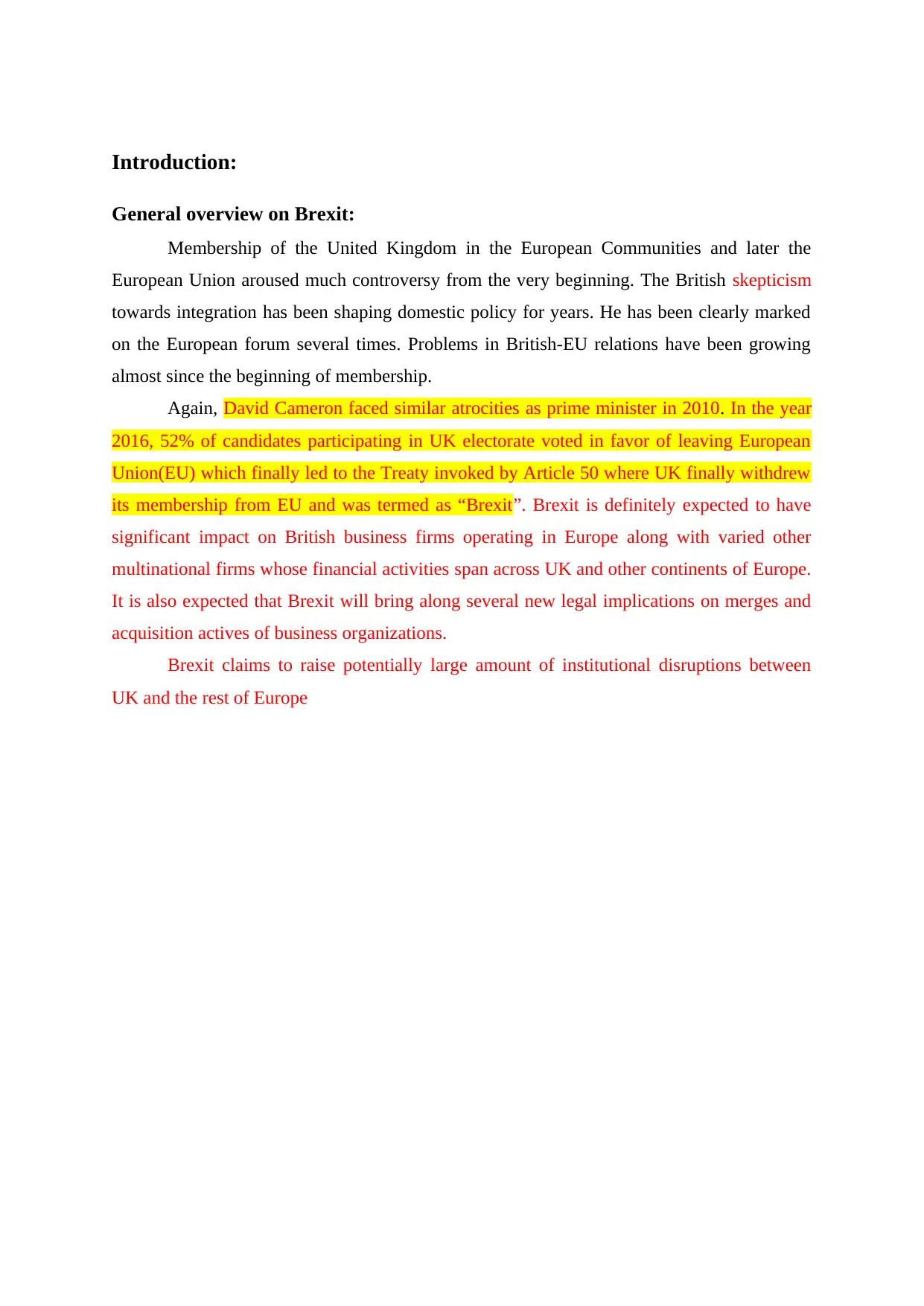
Introduction:
General overview on Brexit:
Membership of the United Kingdom in the European Communities and later the
European Union aroused much controversy from the very beginning. The British skepticism
towards integration has been shaping domestic policy for years. He has been clearly marked
on the European forum several times. Problems in British-EU relations have been growing
almost since the beginning of membership.
Again, David Cameron faced similar atrocities as prime minister in 2010. In the year
2016, 52% of candidates participating in UK electorate voted in favor of leaving European
Union(EU) which finally led to the Treaty invoked by Article 50 where UK finally withdrew
its membership from EU and was termed as “Brexit”. Brexit is definitely expected to have
significant impact on British business firms operating in Europe along with varied other
multinational firms whose financial activities span across UK and other continents of Europe.
It is also expected that Brexit will bring along several new legal implications on merges and
acquisition actives of business organizations.
Brexit claims to raise potentially large amount of institutional disruptions between
UK and the rest of Europe
General overview on Brexit:
Membership of the United Kingdom in the European Communities and later the
European Union aroused much controversy from the very beginning. The British skepticism
towards integration has been shaping domestic policy for years. He has been clearly marked
on the European forum several times. Problems in British-EU relations have been growing
almost since the beginning of membership.
Again, David Cameron faced similar atrocities as prime minister in 2010. In the year
2016, 52% of candidates participating in UK electorate voted in favor of leaving European
Union(EU) which finally led to the Treaty invoked by Article 50 where UK finally withdrew
its membership from EU and was termed as “Brexit”. Brexit is definitely expected to have
significant impact on British business firms operating in Europe along with varied other
multinational firms whose financial activities span across UK and other continents of Europe.
It is also expected that Brexit will bring along several new legal implications on merges and
acquisition actives of business organizations.
Brexit claims to raise potentially large amount of institutional disruptions between
UK and the rest of Europe
Secure Best Marks with AI Grader
Need help grading? Try our AI Grader for instant feedback on your assignments.
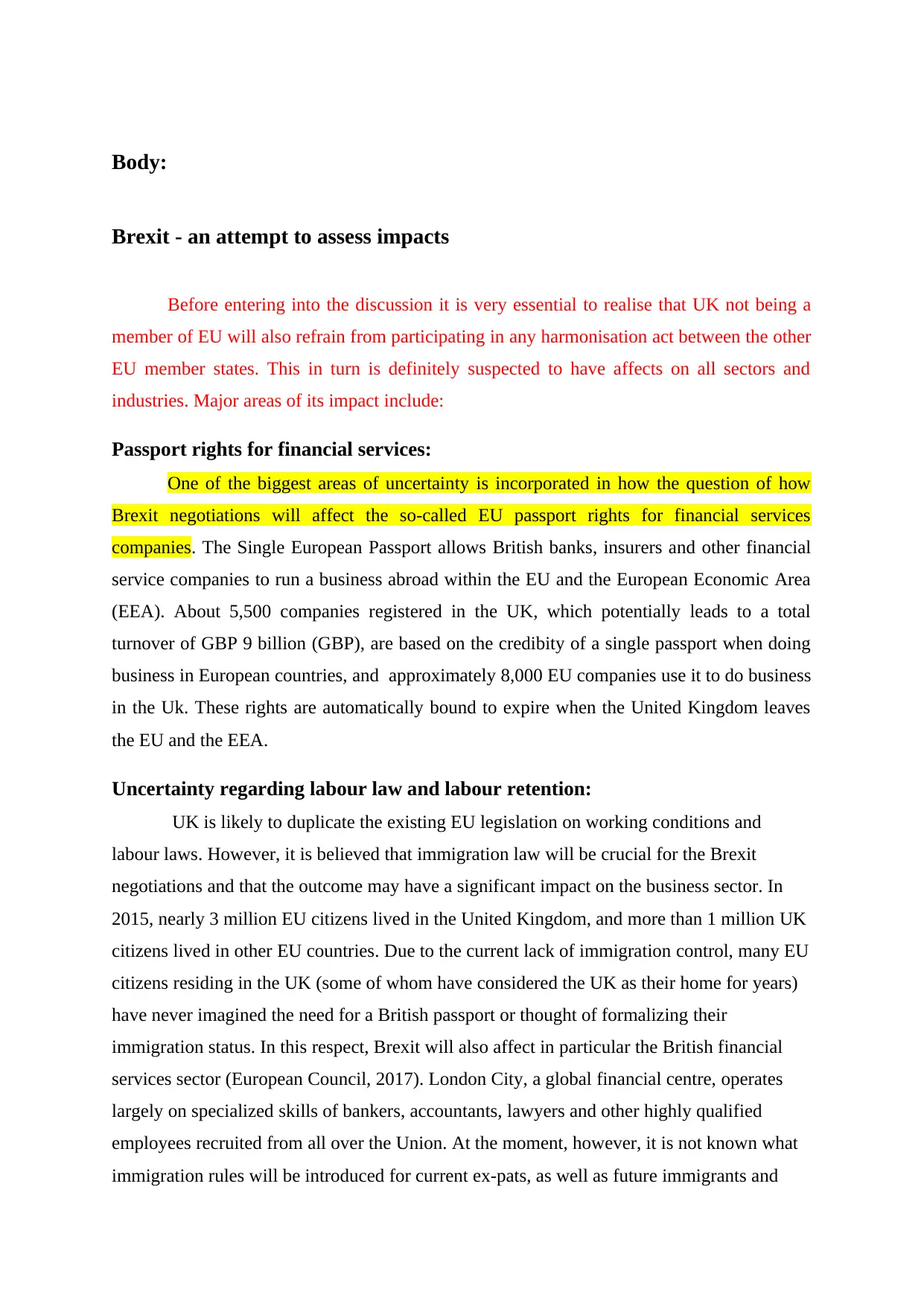
Body:
Brexit - an attempt to assess impacts
Before entering into the discussion it is very essential to realise that UK not being a
member of EU will also refrain from participating in any harmonisation act between the other
EU member states. This in turn is definitely suspected to have affects on all sectors and
industries. Major areas of its impact include:
Passport rights for financial services:
One of the biggest areas of uncertainty is incorporated in how the question of how
Brexit negotiations will affect the so-called EU passport rights for financial services
companies. The Single European Passport allows British banks, insurers and other financial
service companies to run a business abroad within the EU and the European Economic Area
(EEA). About 5,500 companies registered in the UK, which potentially leads to a total
turnover of GBP 9 billion (GBP), are based on the credibity of a single passport when doing
business in European countries, and approximately 8,000 EU companies use it to do business
in the Uk. These rights are automatically bound to expire when the United Kingdom leaves
the EU and the EEA.
Uncertainty regarding labour law and labour retention:
UK is likely to duplicate the existing EU legislation on working conditions and
labour laws. However, it is believed that immigration law will be crucial for the Brexit
negotiations and that the outcome may have a significant impact on the business sector. In
2015, nearly 3 million EU citizens lived in the United Kingdom, and more than 1 million UK
citizens lived in other EU countries. Due to the current lack of immigration control, many EU
citizens residing in the UK (some of whom have considered the UK as their home for years)
have never imagined the need for a British passport or thought of formalizing their
immigration status. In this respect, Brexit will also affect in particular the British financial
services sector (European Council, 2017). London City, a global financial centre, operates
largely on specialized skills of bankers, accountants, lawyers and other highly qualified
employees recruited from all over the Union. At the moment, however, it is not known what
immigration rules will be introduced for current ex-pats, as well as future immigrants and
Brexit - an attempt to assess impacts
Before entering into the discussion it is very essential to realise that UK not being a
member of EU will also refrain from participating in any harmonisation act between the other
EU member states. This in turn is definitely suspected to have affects on all sectors and
industries. Major areas of its impact include:
Passport rights for financial services:
One of the biggest areas of uncertainty is incorporated in how the question of how
Brexit negotiations will affect the so-called EU passport rights for financial services
companies. The Single European Passport allows British banks, insurers and other financial
service companies to run a business abroad within the EU and the European Economic Area
(EEA). About 5,500 companies registered in the UK, which potentially leads to a total
turnover of GBP 9 billion (GBP), are based on the credibity of a single passport when doing
business in European countries, and approximately 8,000 EU companies use it to do business
in the Uk. These rights are automatically bound to expire when the United Kingdom leaves
the EU and the EEA.
Uncertainty regarding labour law and labour retention:
UK is likely to duplicate the existing EU legislation on working conditions and
labour laws. However, it is believed that immigration law will be crucial for the Brexit
negotiations and that the outcome may have a significant impact on the business sector. In
2015, nearly 3 million EU citizens lived in the United Kingdom, and more than 1 million UK
citizens lived in other EU countries. Due to the current lack of immigration control, many EU
citizens residing in the UK (some of whom have considered the UK as their home for years)
have never imagined the need for a British passport or thought of formalizing their
immigration status. In this respect, Brexit will also affect in particular the British financial
services sector (European Council, 2017). London City, a global financial centre, operates
largely on specialized skills of bankers, accountants, lawyers and other highly qualified
employees recruited from all over the Union. At the moment, however, it is not known what
immigration rules will be introduced for current ex-pats, as well as future immigrants and
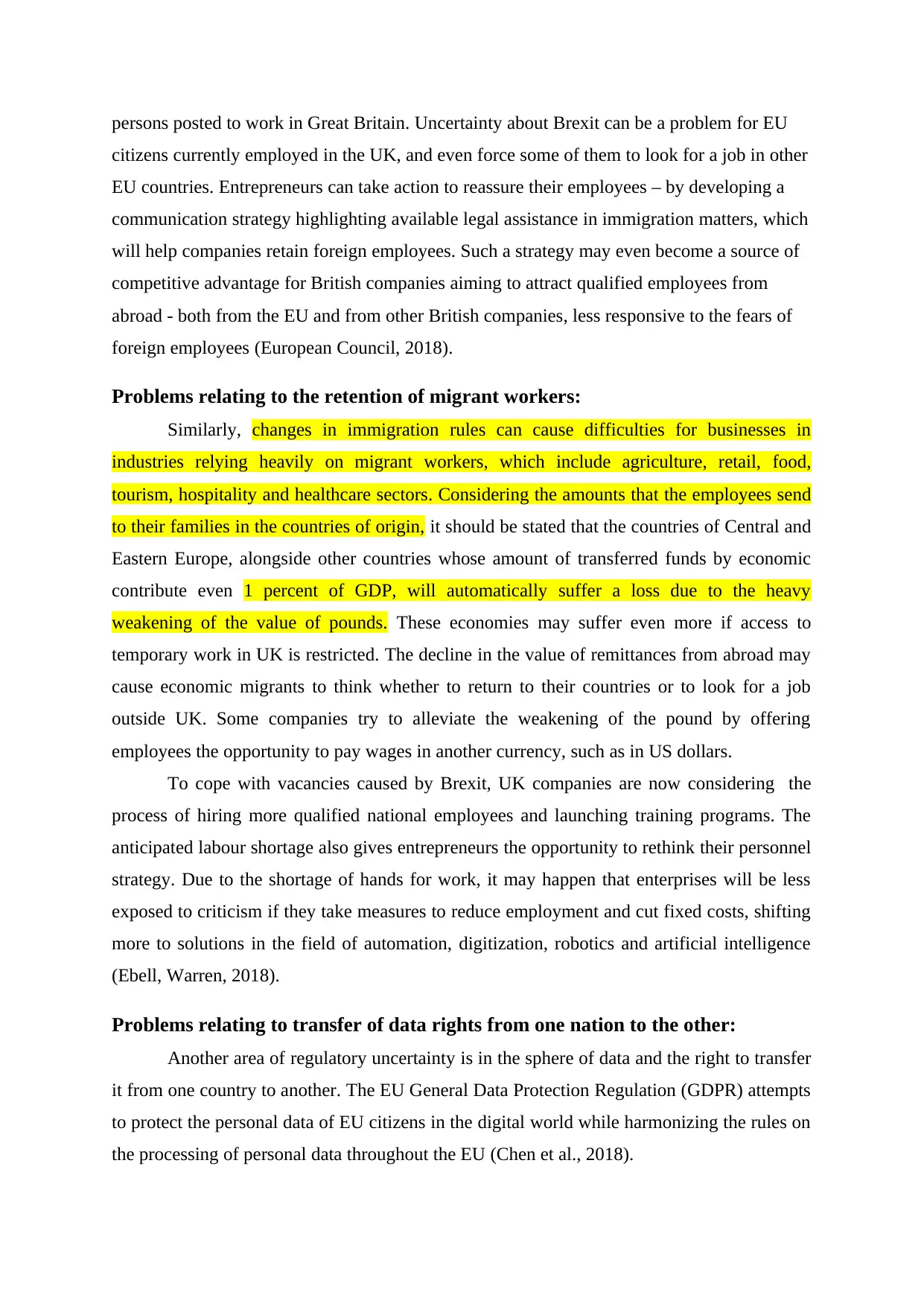
persons posted to work in Great Britain. Uncertainty about Brexit can be a problem for EU
citizens currently employed in the UK, and even force some of them to look for a job in other
EU countries. Entrepreneurs can take action to reassure their employees – by developing a
communication strategy highlighting available legal assistance in immigration matters, which
will help companies retain foreign employees. Such a strategy may even become a source of
competitive advantage for British companies aiming to attract qualified employees from
abroad - both from the EU and from other British companies, less responsive to the fears of
foreign employees (European Council, 2018).
Problems relating to the retention of migrant workers:
Similarly, changes in immigration rules can cause difficulties for businesses in
industries relying heavily on migrant workers, which include agriculture, retail, food,
tourism, hospitality and healthcare sectors. Considering the amounts that the employees send
to their families in the countries of origin, it should be stated that the countries of Central and
Eastern Europe, alongside other countries whose amount of transferred funds by economic
contribute even 1 percent of GDP, will automatically suffer a loss due to the heavy
weakening of the value of pounds. These economies may suffer even more if access to
temporary work in UK is restricted. The decline in the value of remittances from abroad may
cause economic migrants to think whether to return to their countries or to look for a job
outside UK. Some companies try to alleviate the weakening of the pound by offering
employees the opportunity to pay wages in another currency, such as in US dollars.
To cope with vacancies caused by Brexit, UK companies are now considering the
process of hiring more qualified national employees and launching training programs. The
anticipated labour shortage also gives entrepreneurs the opportunity to rethink their personnel
strategy. Due to the shortage of hands for work, it may happen that enterprises will be less
exposed to criticism if they take measures to reduce employment and cut fixed costs, shifting
more to solutions in the field of automation, digitization, robotics and artificial intelligence
(Ebell, Warren, 2018).
Problems relating to transfer of data rights from one nation to the other:
Another area of regulatory uncertainty is in the sphere of data and the right to transfer
it from one country to another. The EU General Data Protection Regulation (GDPR) attempts
to protect the personal data of EU citizens in the digital world while harmonizing the rules on
the processing of personal data throughout the EU (Chen et al., 2018).
citizens currently employed in the UK, and even force some of them to look for a job in other
EU countries. Entrepreneurs can take action to reassure their employees – by developing a
communication strategy highlighting available legal assistance in immigration matters, which
will help companies retain foreign employees. Such a strategy may even become a source of
competitive advantage for British companies aiming to attract qualified employees from
abroad - both from the EU and from other British companies, less responsive to the fears of
foreign employees (European Council, 2018).
Problems relating to the retention of migrant workers:
Similarly, changes in immigration rules can cause difficulties for businesses in
industries relying heavily on migrant workers, which include agriculture, retail, food,
tourism, hospitality and healthcare sectors. Considering the amounts that the employees send
to their families in the countries of origin, it should be stated that the countries of Central and
Eastern Europe, alongside other countries whose amount of transferred funds by economic
contribute even 1 percent of GDP, will automatically suffer a loss due to the heavy
weakening of the value of pounds. These economies may suffer even more if access to
temporary work in UK is restricted. The decline in the value of remittances from abroad may
cause economic migrants to think whether to return to their countries or to look for a job
outside UK. Some companies try to alleviate the weakening of the pound by offering
employees the opportunity to pay wages in another currency, such as in US dollars.
To cope with vacancies caused by Brexit, UK companies are now considering the
process of hiring more qualified national employees and launching training programs. The
anticipated labour shortage also gives entrepreneurs the opportunity to rethink their personnel
strategy. Due to the shortage of hands for work, it may happen that enterprises will be less
exposed to criticism if they take measures to reduce employment and cut fixed costs, shifting
more to solutions in the field of automation, digitization, robotics and artificial intelligence
(Ebell, Warren, 2018).
Problems relating to transfer of data rights from one nation to the other:
Another area of regulatory uncertainty is in the sphere of data and the right to transfer
it from one country to another. The EU General Data Protection Regulation (GDPR) attempts
to protect the personal data of EU citizens in the digital world while harmonizing the rules on
the processing of personal data throughout the EU (Chen et al., 2018).
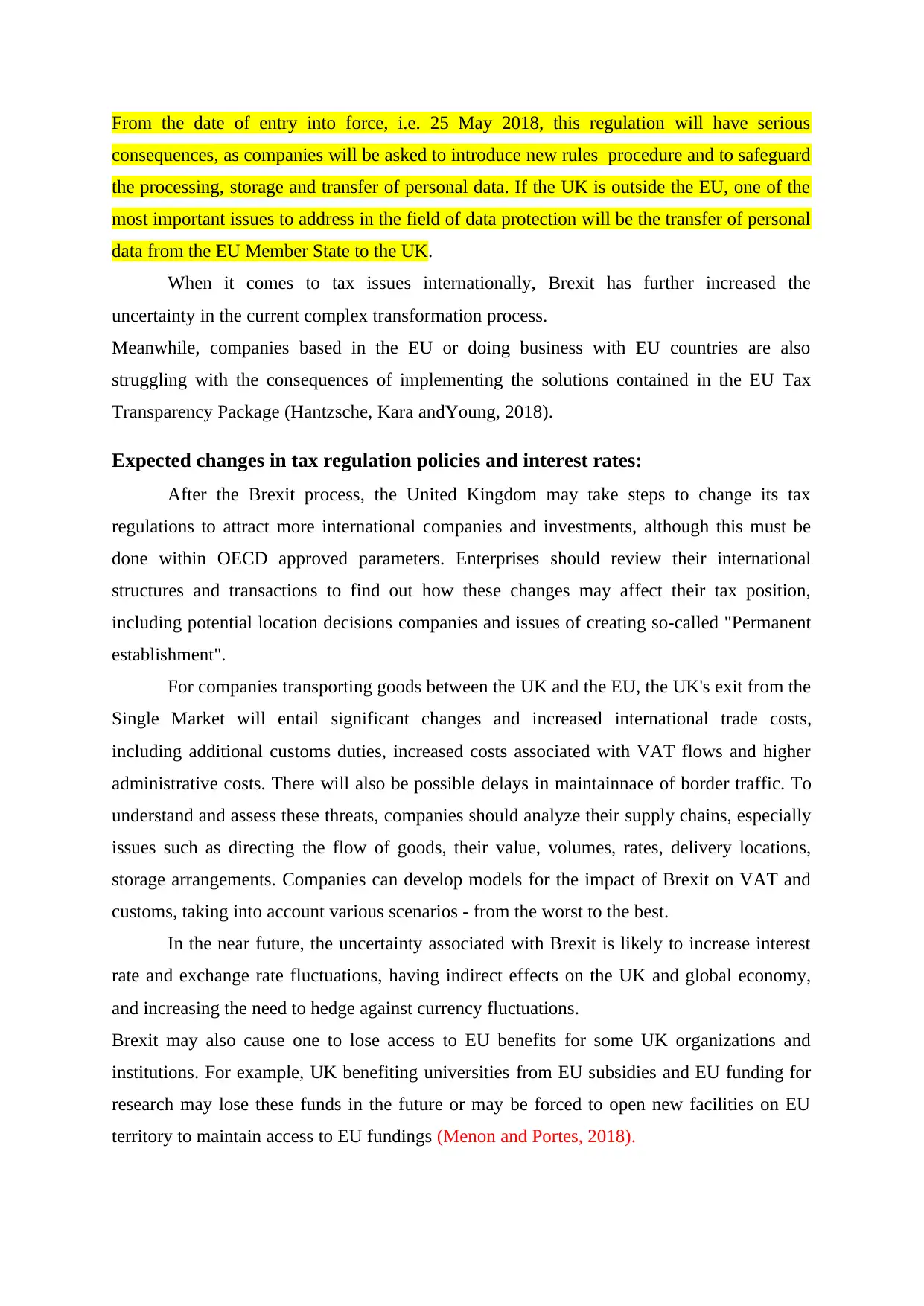
From the date of entry into force, i.e. 25 May 2018, this regulation will have serious
consequences, as companies will be asked to introduce new rules procedure and to safeguard
the processing, storage and transfer of personal data. If the UK is outside the EU, one of the
most important issues to address in the field of data protection will be the transfer of personal
data from the EU Member State to the UK.
When it comes to tax issues internationally, Brexit has further increased the
uncertainty in the current complex transformation process.
Meanwhile, companies based in the EU or doing business with EU countries are also
struggling with the consequences of implementing the solutions contained in the EU Tax
Transparency Package (Hantzsche, Kara andYoung, 2018).
Expected changes in tax regulation policies and interest rates:
After the Brexit process, the United Kingdom may take steps to change its tax
regulations to attract more international companies and investments, although this must be
done within OECD approved parameters. Enterprises should review their international
structures and transactions to find out how these changes may affect their tax position,
including potential location decisions companies and issues of creating so-called "Permanent
establishment".
For companies transporting goods between the UK and the EU, the UK's exit from the
Single Market will entail significant changes and increased international trade costs,
including additional customs duties, increased costs associated with VAT flows and higher
administrative costs. There will also be possible delays in maintainnace of border traffic. To
understand and assess these threats, companies should analyze their supply chains, especially
issues such as directing the flow of goods, their value, volumes, rates, delivery locations,
storage arrangements. Companies can develop models for the impact of Brexit on VAT and
customs, taking into account various scenarios - from the worst to the best.
In the near future, the uncertainty associated with Brexit is likely to increase interest
rate and exchange rate fluctuations, having indirect effects on the UK and global economy,
and increasing the need to hedge against currency fluctuations.
Brexit may also cause one to lose access to EU benefits for some UK organizations and
institutions. For example, UK benefiting universities from EU subsidies and EU funding for
research may lose these funds in the future or may be forced to open new facilities on EU
territory to maintain access to EU fundings (Menon and Portes, 2018).
consequences, as companies will be asked to introduce new rules procedure and to safeguard
the processing, storage and transfer of personal data. If the UK is outside the EU, one of the
most important issues to address in the field of data protection will be the transfer of personal
data from the EU Member State to the UK.
When it comes to tax issues internationally, Brexit has further increased the
uncertainty in the current complex transformation process.
Meanwhile, companies based in the EU or doing business with EU countries are also
struggling with the consequences of implementing the solutions contained in the EU Tax
Transparency Package (Hantzsche, Kara andYoung, 2018).
Expected changes in tax regulation policies and interest rates:
After the Brexit process, the United Kingdom may take steps to change its tax
regulations to attract more international companies and investments, although this must be
done within OECD approved parameters. Enterprises should review their international
structures and transactions to find out how these changes may affect their tax position,
including potential location decisions companies and issues of creating so-called "Permanent
establishment".
For companies transporting goods between the UK and the EU, the UK's exit from the
Single Market will entail significant changes and increased international trade costs,
including additional customs duties, increased costs associated with VAT flows and higher
administrative costs. There will also be possible delays in maintainnace of border traffic. To
understand and assess these threats, companies should analyze their supply chains, especially
issues such as directing the flow of goods, their value, volumes, rates, delivery locations,
storage arrangements. Companies can develop models for the impact of Brexit on VAT and
customs, taking into account various scenarios - from the worst to the best.
In the near future, the uncertainty associated with Brexit is likely to increase interest
rate and exchange rate fluctuations, having indirect effects on the UK and global economy,
and increasing the need to hedge against currency fluctuations.
Brexit may also cause one to lose access to EU benefits for some UK organizations and
institutions. For example, UK benefiting universities from EU subsidies and EU funding for
research may lose these funds in the future or may be forced to open new facilities on EU
territory to maintain access to EU fundings (Menon and Portes, 2018).
Paraphrase This Document
Need a fresh take? Get an instant paraphrase of this document with our AI Paraphraser
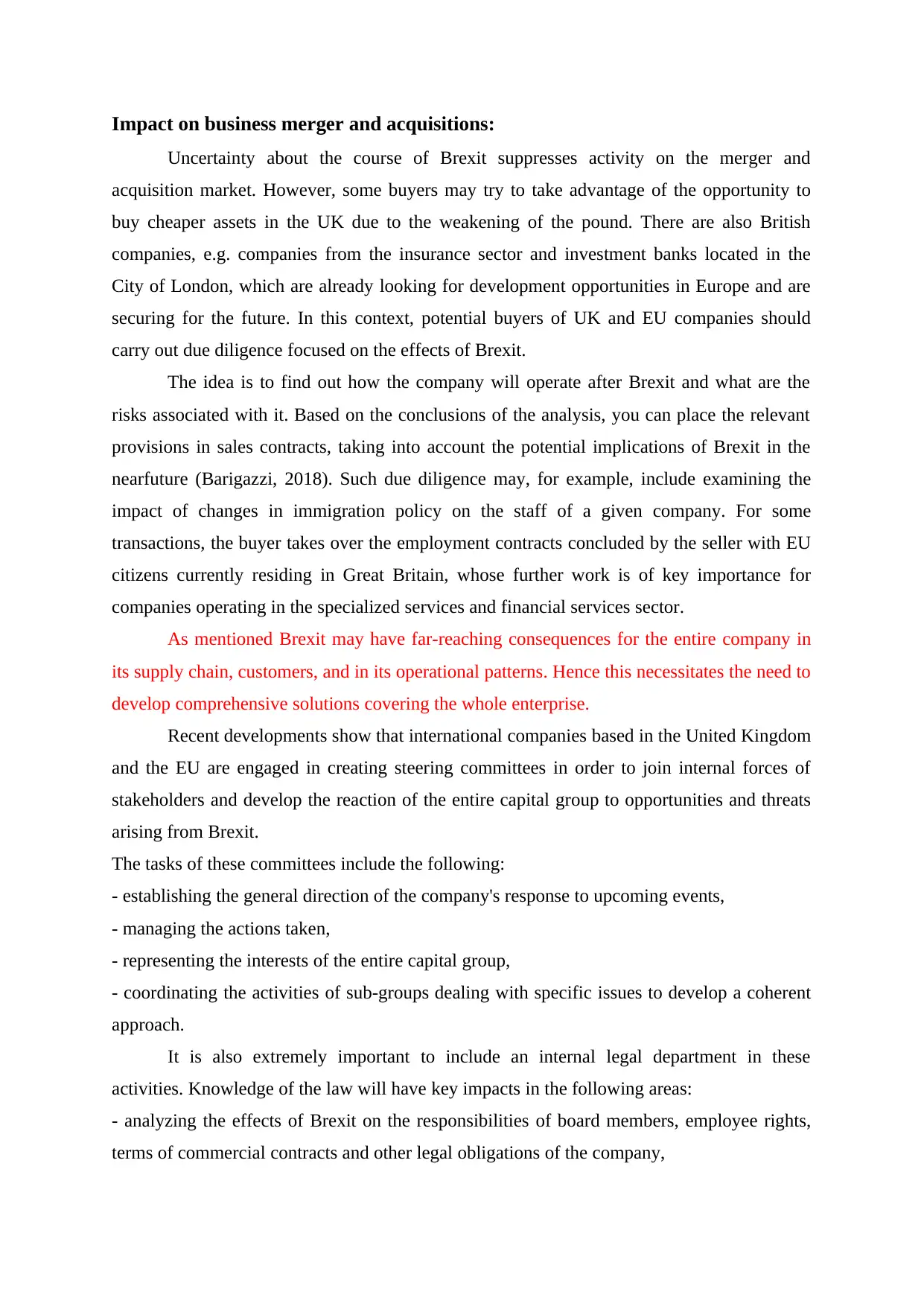
Impact on business merger and acquisitions:
Uncertainty about the course of Brexit suppresses activity on the merger and
acquisition market. However, some buyers may try to take advantage of the opportunity to
buy cheaper assets in the UK due to the weakening of the pound. There are also British
companies, e.g. companies from the insurance sector and investment banks located in the
City of London, which are already looking for development opportunities in Europe and are
securing for the future. In this context, potential buyers of UK and EU companies should
carry out due diligence focused on the effects of Brexit.
The idea is to find out how the company will operate after Brexit and what are the
risks associated with it. Based on the conclusions of the analysis, you can place the relevant
provisions in sales contracts, taking into account the potential implications of Brexit in the
nearfuture (Barigazzi, 2018). Such due diligence may, for example, include examining the
impact of changes in immigration policy on the staff of a given company. For some
transactions, the buyer takes over the employment contracts concluded by the seller with EU
citizens currently residing in Great Britain, whose further work is of key importance for
companies operating in the specialized services and financial services sector.
As mentioned Brexit may have far-reaching consequences for the entire company in
its supply chain, customers, and in its operational patterns. Hence this necessitates the need to
develop comprehensive solutions covering the whole enterprise.
Recent developments show that international companies based in the United Kingdom
and the EU are engaged in creating steering committees in order to join internal forces of
stakeholders and develop the reaction of the entire capital group to opportunities and threats
arising from Brexit.
The tasks of these committees include the following:
- establishing the general direction of the company's response to upcoming events,
- managing the actions taken,
- representing the interests of the entire capital group,
- coordinating the activities of sub-groups dealing with specific issues to develop a coherent
approach.
It is also extremely important to include an internal legal department in these
activities. Knowledge of the law will have key impacts in the following areas:
- analyzing the effects of Brexit on the responsibilities of board members, employee rights,
terms of commercial contracts and other legal obligations of the company,
Uncertainty about the course of Brexit suppresses activity on the merger and
acquisition market. However, some buyers may try to take advantage of the opportunity to
buy cheaper assets in the UK due to the weakening of the pound. There are also British
companies, e.g. companies from the insurance sector and investment banks located in the
City of London, which are already looking for development opportunities in Europe and are
securing for the future. In this context, potential buyers of UK and EU companies should
carry out due diligence focused on the effects of Brexit.
The idea is to find out how the company will operate after Brexit and what are the
risks associated with it. Based on the conclusions of the analysis, you can place the relevant
provisions in sales contracts, taking into account the potential implications of Brexit in the
nearfuture (Barigazzi, 2018). Such due diligence may, for example, include examining the
impact of changes in immigration policy on the staff of a given company. For some
transactions, the buyer takes over the employment contracts concluded by the seller with EU
citizens currently residing in Great Britain, whose further work is of key importance for
companies operating in the specialized services and financial services sector.
As mentioned Brexit may have far-reaching consequences for the entire company in
its supply chain, customers, and in its operational patterns. Hence this necessitates the need to
develop comprehensive solutions covering the whole enterprise.
Recent developments show that international companies based in the United Kingdom
and the EU are engaged in creating steering committees in order to join internal forces of
stakeholders and develop the reaction of the entire capital group to opportunities and threats
arising from Brexit.
The tasks of these committees include the following:
- establishing the general direction of the company's response to upcoming events,
- managing the actions taken,
- representing the interests of the entire capital group,
- coordinating the activities of sub-groups dealing with specific issues to develop a coherent
approach.
It is also extremely important to include an internal legal department in these
activities. Knowledge of the law will have key impacts in the following areas:
- analyzing the effects of Brexit on the responsibilities of board members, employee rights,
terms of commercial contracts and other legal obligations of the company,
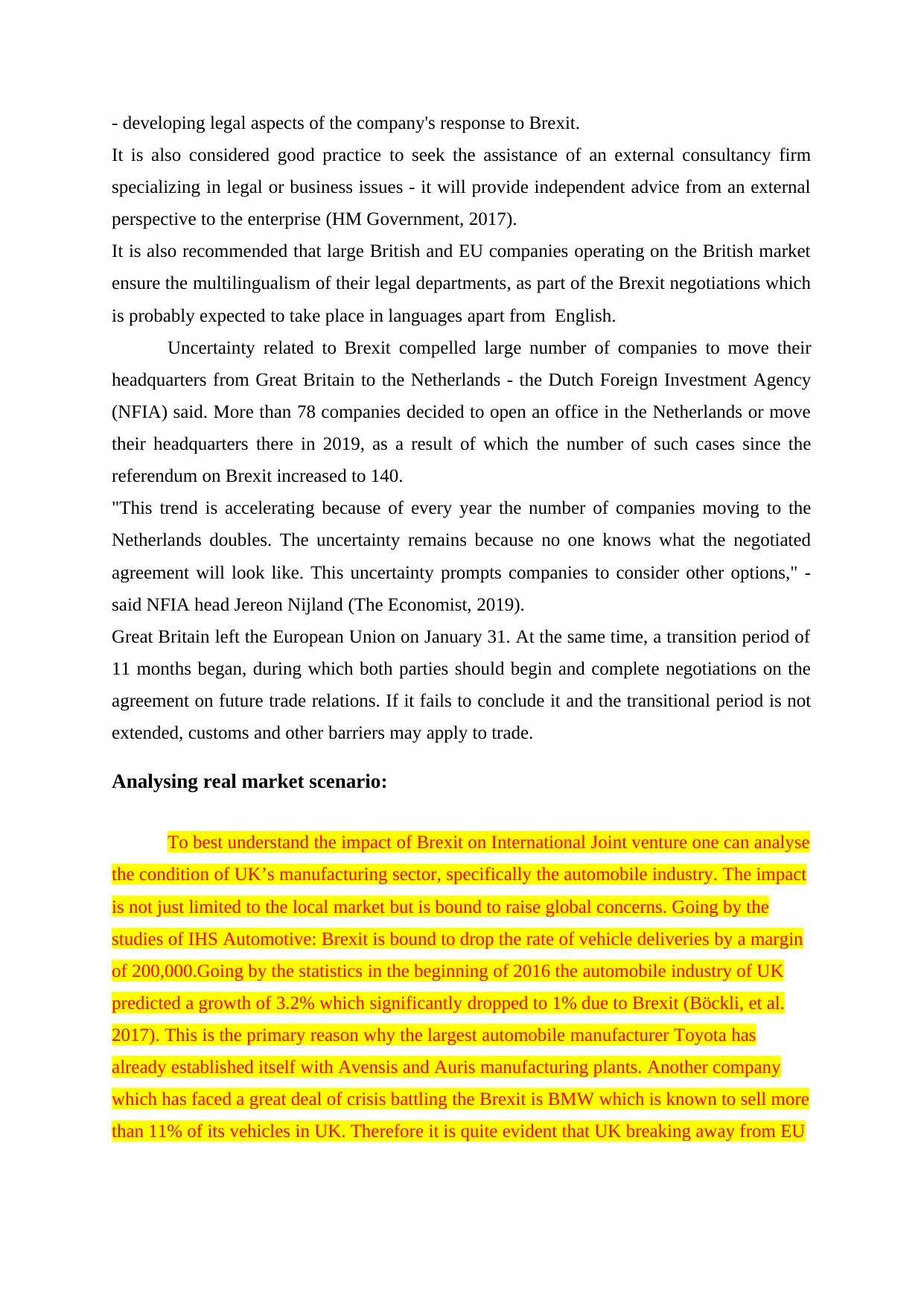
- developing legal aspects of the company's response to Brexit.
It is also considered good practice to seek the assistance of an external consultancy firm
specializing in legal or business issues - it will provide independent advice from an external
perspective to the enterprise (HM Government, 2017).
It is also recommended that large British and EU companies operating on the British market
ensure the multilingualism of their legal departments, as part of the Brexit negotiations which
is probably expected to take place in languages apart from English.
Uncertainty related to Brexit compelled large number of companies to move their
headquarters from Great Britain to the Netherlands - the Dutch Foreign Investment Agency
(NFIA) said. More than 78 companies decided to open an office in the Netherlands or move
their headquarters there in 2019, as a result of which the number of such cases since the
referendum on Brexit increased to 140.
"This trend is accelerating because of every year the number of companies moving to the
Netherlands doubles. The uncertainty remains because no one knows what the negotiated
agreement will look like. This uncertainty prompts companies to consider other options," -
said NFIA head Jereon Nijland (The Economist, 2019).
Great Britain left the European Union on January 31. At the same time, a transition period of
11 months began, during which both parties should begin and complete negotiations on the
agreement on future trade relations. If it fails to conclude it and the transitional period is not
extended, customs and other barriers may apply to trade.
Analysing real market scenario:
To best understand the impact of Brexit on International Joint venture one can analyse
the condition of UK’s manufacturing sector, specifically the automobile industry. The impact
is not just limited to the local market but is bound to raise global concerns. Going by the
studies of IHS Automotive: Brexit is bound to drop the rate of vehicle deliveries by a margin
of 200,000.Going by the statistics in the beginning of 2016 the automobile industry of UK
predicted a growth of 3.2% which significantly dropped to 1% due to Brexit (Böckli, et al.
2017). This is the primary reason why the largest automobile manufacturer Toyota has
already established itself with Avensis and Auris manufacturing plants. Another company
which has faced a great deal of crisis battling the Brexit is BMW which is known to sell more
than 11% of its vehicles in UK. Therefore it is quite evident that UK breaking away from EU
It is also considered good practice to seek the assistance of an external consultancy firm
specializing in legal or business issues - it will provide independent advice from an external
perspective to the enterprise (HM Government, 2017).
It is also recommended that large British and EU companies operating on the British market
ensure the multilingualism of their legal departments, as part of the Brexit negotiations which
is probably expected to take place in languages apart from English.
Uncertainty related to Brexit compelled large number of companies to move their
headquarters from Great Britain to the Netherlands - the Dutch Foreign Investment Agency
(NFIA) said. More than 78 companies decided to open an office in the Netherlands or move
their headquarters there in 2019, as a result of which the number of such cases since the
referendum on Brexit increased to 140.
"This trend is accelerating because of every year the number of companies moving to the
Netherlands doubles. The uncertainty remains because no one knows what the negotiated
agreement will look like. This uncertainty prompts companies to consider other options," -
said NFIA head Jereon Nijland (The Economist, 2019).
Great Britain left the European Union on January 31. At the same time, a transition period of
11 months began, during which both parties should begin and complete negotiations on the
agreement on future trade relations. If it fails to conclude it and the transitional period is not
extended, customs and other barriers may apply to trade.
Analysing real market scenario:
To best understand the impact of Brexit on International Joint venture one can analyse
the condition of UK’s manufacturing sector, specifically the automobile industry. The impact
is not just limited to the local market but is bound to raise global concerns. Going by the
studies of IHS Automotive: Brexit is bound to drop the rate of vehicle deliveries by a margin
of 200,000.Going by the statistics in the beginning of 2016 the automobile industry of UK
predicted a growth of 3.2% which significantly dropped to 1% due to Brexit (Böckli, et al.
2017). This is the primary reason why the largest automobile manufacturer Toyota has
already established itself with Avensis and Auris manufacturing plants. Another company
which has faced a great deal of crisis battling the Brexit is BMW which is known to sell more
than 11% of its vehicles in UK. Therefore it is quite evident that UK breaking away from EU

will definitely introduce new complications specifically catering to the automotive supply
chains either forcing them to increase their sale prices or cutting on their production cost.
chains either forcing them to increase their sale prices or cutting on their production cost.
Secure Best Marks with AI Grader
Need help grading? Try our AI Grader for instant feedback on your assignments.
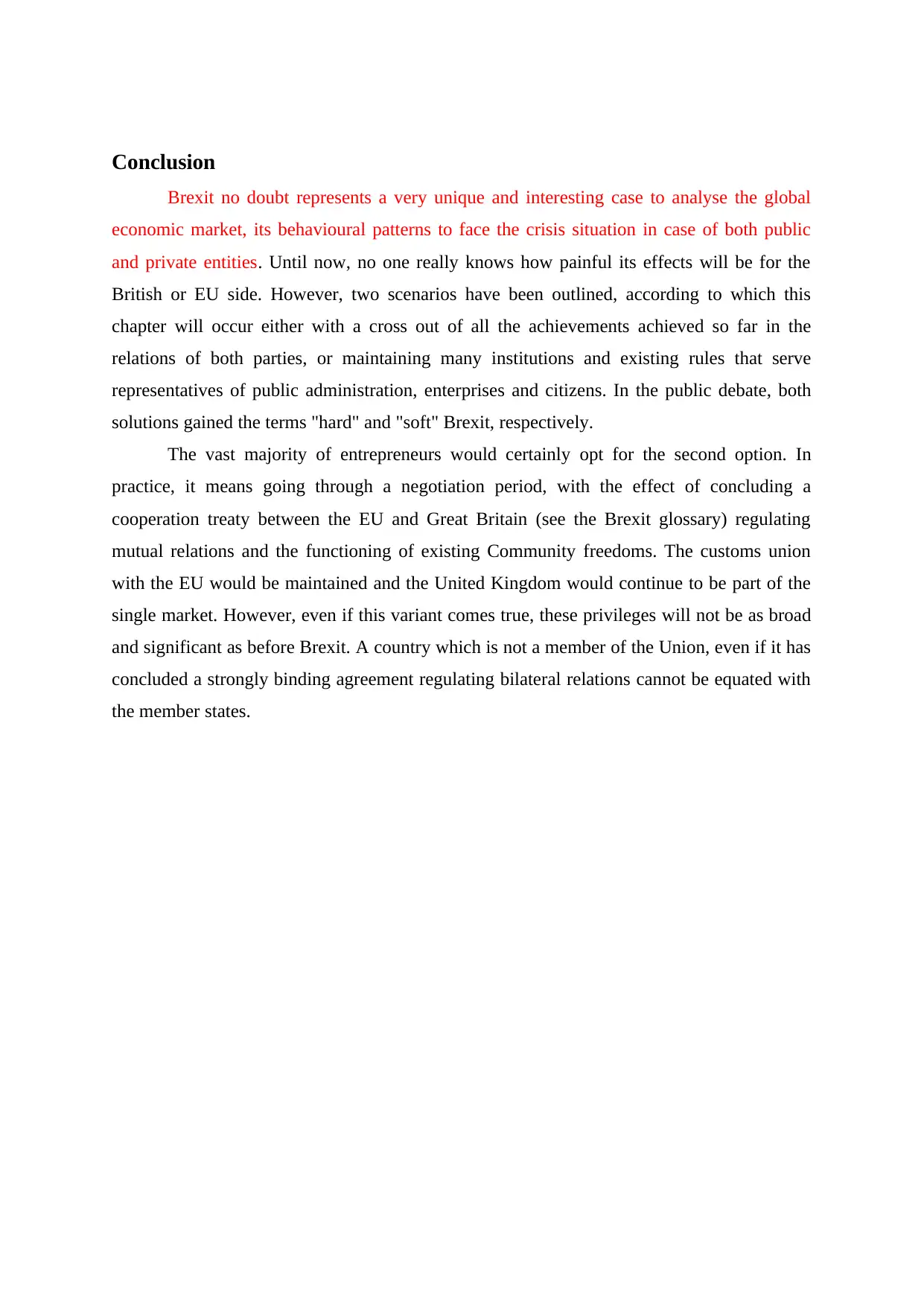
Conclusion
Brexit no doubt represents a very unique and interesting case to analyse the global
economic market, its behavioural patterns to face the crisis situation in case of both public
and private entities. Until now, no one really knows how painful its effects will be for the
British or EU side. However, two scenarios have been outlined, according to which this
chapter will occur either with a cross out of all the achievements achieved so far in the
relations of both parties, or maintaining many institutions and existing rules that serve
representatives of public administration, enterprises and citizens. In the public debate, both
solutions gained the terms "hard" and "soft" Brexit, respectively.
The vast majority of entrepreneurs would certainly opt for the second option. In
practice, it means going through a negotiation period, with the effect of concluding a
cooperation treaty between the EU and Great Britain (see the Brexit glossary) regulating
mutual relations and the functioning of existing Community freedoms. The customs union
with the EU would be maintained and the United Kingdom would continue to be part of the
single market. However, even if this variant comes true, these privileges will not be as broad
and significant as before Brexit. A country which is not a member of the Union, even if it has
concluded a strongly binding agreement regulating bilateral relations cannot be equated with
the member states.
Brexit no doubt represents a very unique and interesting case to analyse the global
economic market, its behavioural patterns to face the crisis situation in case of both public
and private entities. Until now, no one really knows how painful its effects will be for the
British or EU side. However, two scenarios have been outlined, according to which this
chapter will occur either with a cross out of all the achievements achieved so far in the
relations of both parties, or maintaining many institutions and existing rules that serve
representatives of public administration, enterprises and citizens. In the public debate, both
solutions gained the terms "hard" and "soft" Brexit, respectively.
The vast majority of entrepreneurs would certainly opt for the second option. In
practice, it means going through a negotiation period, with the effect of concluding a
cooperation treaty between the EU and Great Britain (see the Brexit glossary) regulating
mutual relations and the functioning of existing Community freedoms. The customs union
with the EU would be maintained and the United Kingdom would continue to be part of the
single market. However, even if this variant comes true, these privileges will not be as broad
and significant as before Brexit. A country which is not a member of the Union, even if it has
concluded a strongly binding agreement regulating bilateral relations cannot be equated with
the member states.

Recommendation:
To best survive this undulating business situation, the British companies build up a
strong corporate customs infrastructure. The companies need to obtain an authorised financial
operator status which might be a tiring but rewarding process for bringing much more
financial gains. The business houses also needs to rethink on their decision of whether they
want to make use of a bilateral trade agreement which might seem to save costs on tariff but
in the longer run may give way to bureaucracy. Companies need to be more aware about their
cash flow as VAT will be charged at the border while importing goods and services.
Protection of one’s intellectual property might turn it a lot more different since the
application of Brexit (Bloom, Chen and Mizen, 2018). Hence companies need to be quick
and on their feet once it leaves EU to protect their existing rights
To best survive this undulating business situation, the British companies build up a
strong corporate customs infrastructure. The companies need to obtain an authorised financial
operator status which might be a tiring but rewarding process for bringing much more
financial gains. The business houses also needs to rethink on their decision of whether they
want to make use of a bilateral trade agreement which might seem to save costs on tariff but
in the longer run may give way to bureaucracy. Companies need to be more aware about their
cash flow as VAT will be charged at the border while importing goods and services.
Protection of one’s intellectual property might turn it a lot more different since the
application of Brexit (Bloom, Chen and Mizen, 2018). Hence companies need to be quick
and on their feet once it leaves EU to protect their existing rights

Paraphrase This Document
Need a fresh take? Get an instant paraphrase of this document with our AI Paraphraser
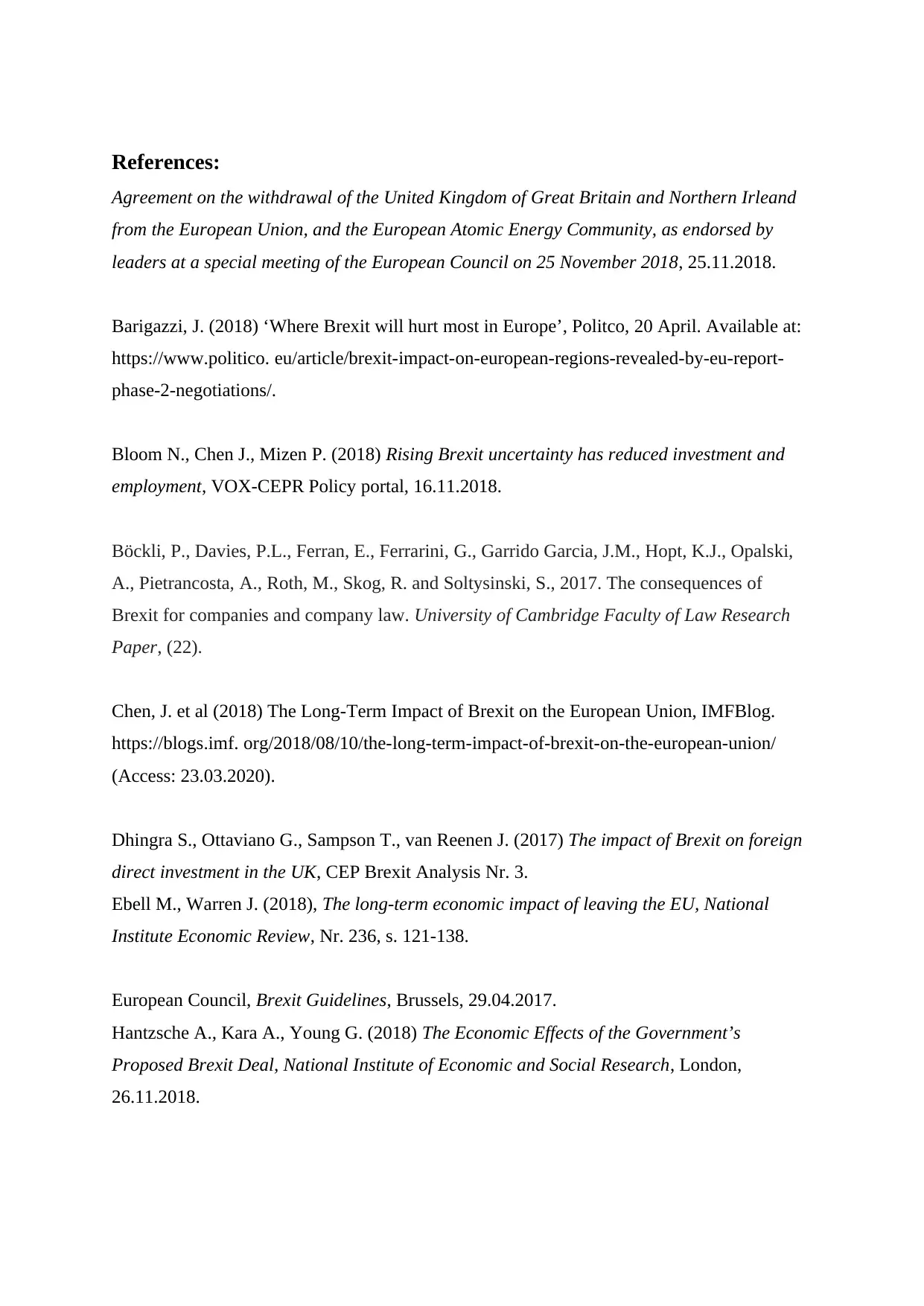
References:
Agreement on the withdrawal of the United Kingdom of Great Britain and Northern Irleand
from the European Union, and the European Atomic Energy Community, as endorsed by
leaders at a special meeting of the European Council on 25 November 2018, 25.11.2018.
Barigazzi, J. (2018) ‘Where Brexit will hurt most in Europe’, Politco, 20 April. Available at:
https://www.politico. eu/article/brexit-impact-on-european-regions-revealed-by-eu-report-
phase-2-negotiations/.
Bloom N., Chen J., Mizen P. (2018) Rising Brexit uncertainty has reduced investment and
employment, VOX-CEPR Policy portal, 16.11.2018.
Böckli, P., Davies, P.L., Ferran, E., Ferrarini, G., Garrido Garcia, J.M., Hopt, K.J., Opalski,
A., Pietrancosta, A., Roth, M., Skog, R. and Soltysinski, S., 2017. The consequences of
Brexit for companies and company law. University of Cambridge Faculty of Law Research
Paper, (22).
Chen, J. et al (2018) The Long-Term Impact of Brexit on the European Union, IMFBlog.
https://blogs.imf. org/2018/08/10/the-long-term-impact-of-brexit-on-the-european-union/
(Access: 23.03.2020).
Dhingra S., Ottaviano G., Sampson T., van Reenen J. (2017) The impact of Brexit on foreign
direct investment in the UK, CEP Brexit Analysis Nr. 3.
Ebell M., Warren J. (2018), The long-term economic impact of leaving the EU, National
Institute Economic Review, Nr. 236, s. 121-138.
European Council, Brexit Guidelines, Brussels, 29.04.2017.
Hantzsche A., Kara A., Young G. (2018) The Economic Effects of the Government’s
Proposed Brexit Deal, National Institute of Economic and Social Research, London,
26.11.2018.
Agreement on the withdrawal of the United Kingdom of Great Britain and Northern Irleand
from the European Union, and the European Atomic Energy Community, as endorsed by
leaders at a special meeting of the European Council on 25 November 2018, 25.11.2018.
Barigazzi, J. (2018) ‘Where Brexit will hurt most in Europe’, Politco, 20 April. Available at:
https://www.politico. eu/article/brexit-impact-on-european-regions-revealed-by-eu-report-
phase-2-negotiations/.
Bloom N., Chen J., Mizen P. (2018) Rising Brexit uncertainty has reduced investment and
employment, VOX-CEPR Policy portal, 16.11.2018.
Böckli, P., Davies, P.L., Ferran, E., Ferrarini, G., Garrido Garcia, J.M., Hopt, K.J., Opalski,
A., Pietrancosta, A., Roth, M., Skog, R. and Soltysinski, S., 2017. The consequences of
Brexit for companies and company law. University of Cambridge Faculty of Law Research
Paper, (22).
Chen, J. et al (2018) The Long-Term Impact of Brexit on the European Union, IMFBlog.
https://blogs.imf. org/2018/08/10/the-long-term-impact-of-brexit-on-the-european-union/
(Access: 23.03.2020).
Dhingra S., Ottaviano G., Sampson T., van Reenen J. (2017) The impact of Brexit on foreign
direct investment in the UK, CEP Brexit Analysis Nr. 3.
Ebell M., Warren J. (2018), The long-term economic impact of leaving the EU, National
Institute Economic Review, Nr. 236, s. 121-138.
European Council, Brexit Guidelines, Brussels, 29.04.2017.
Hantzsche A., Kara A., Young G. (2018) The Economic Effects of the Government’s
Proposed Brexit Deal, National Institute of Economic and Social Research, London,
26.11.2018.
1 out of 14
Related Documents
Your All-in-One AI-Powered Toolkit for Academic Success.
+13062052269
info@desklib.com
Available 24*7 on WhatsApp / Email
![[object Object]](/_next/static/media/star-bottom.7253800d.svg)
Unlock your academic potential
© 2024 | Zucol Services PVT LTD | All rights reserved.




